May 16, 2025 | 10:38 GMT +7
May 16, 2025 | 10:38 GMT +7
Hotline: 0913.378.918
May 16, 2025 | 10:38 GMT +7
Hotline: 0913.378.918
With just a referral, wildlife traffickers specializing in collecting forest animals can readily fulfill orders, ranging from common species such as bird, chicken, rabbit, bamboo rat, and pig to IIB-category animals such as civet, wildcat, crab-eating macaque, monitor lizard, turtle, mouse-deer, and deer. Even species categorized under 1B, such as king cobra, pangolin, langur, and gaur, are available.
The majority of these animals are hunted in the forests of Cambodia and subsequently transported into Vietnam through 'hidden' channels, which include rails, open routes and narrow paths along the borders between Cambodian and the districts of Loc Ninh and Bu Dop in Binh Phuoc province. Smugglers employ various tactics to conceal their products and openly pass through border checkpoints without detection.
"I can't promise how long it will take to get the goods because it depends on the hunters, but as long as you place the order, it will be fulfilled, even for rare species," affirmed the wildlife trafficker.
Gaining access to these specialized wildlife traffickers was a challenging task. I had to utilize all my connections in the border areas of Bu Dop, Loc Ninh; they are all locals who are well-connected and familiar with the terrain. However, establishing contact with the trafficker still took considerable time and effort.
After numerous phone conversations, T., a local in Dong Xoai city, managed to connect me with M., the wildlife trafficking kingpin in a commune under Bu Dop district. We immediately set out on our journey.
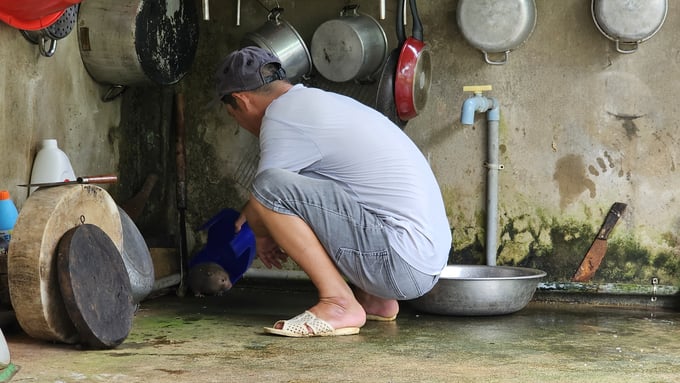
M., a wildlife trafficking kingpin in the border area of Bu Dop district. Photo: Reporters.
After driving for over two hours from Dong Xoai city, we arrived at the border area. Our vehicle continued for another half an hour, travelling through small dirt roads guided by M.'s directions over the phone. We eventually stopped in front of a modest single-story house. "This location is only a few hundred meters from the border," my friend remarked.
We were greeted by M.'s wife, a relatively young woman. After exchanging a few greetings, she led us to the back of the house through a narrow corridor between two buildings. We spotted M. preparing some bamboo rats near the kitchen. "This is Hung. He's from Saigon and wants to open a restaurant specializing in wildlife delicacies for connoisseurs. He's already secured a location, and now he's looking for a stable supply. He's been in touch with a few contacts, and he's visiting today to discuss potential cooperation at T.'s recommendation," my local friend introduced, gesturing towards me. M. nodded in greeting before returning to his work. "Please have a seat and wait for a moment. We're almost done here; we have lunch orders to fulfill, and then I'll be free to talk." Although this is our first meeting, M. seemed quite relaxed, showing no signs of suspicion or hesitation. When I took out my phone to record and photograph the scene, M. did not react negatively.

A cage for captive monitor lizards inside M.'s house. Photo: Reporters.
"How long does it take to fulfill an order?" M. replied, "I can't guarantee anything in advance, because it depends on our contacts in Cambodia. We sell whatever they manage to find. Sometimes, customers place orders but we don't have the animals available. Other times, they manage to find rare products, but we struggle to find buyers here. We don't tend to keep many animals in stock, especially those listed in the red book, whether alive or frozen. Keeping them alive for too long is risky because when they stop eating and lose weight, which will lead to heavy losses. There is also the risk of getting caught during transportation. But if you need a product urgently, I can contact multiple sources to expedite the process."
"Do I need to make a deposit?" M. replied, "No need, T. has vouched for you." According to my friend, T., the person who vouched for us to meet M., used to be a renowned wildlife trafficker in this area but has since retired.
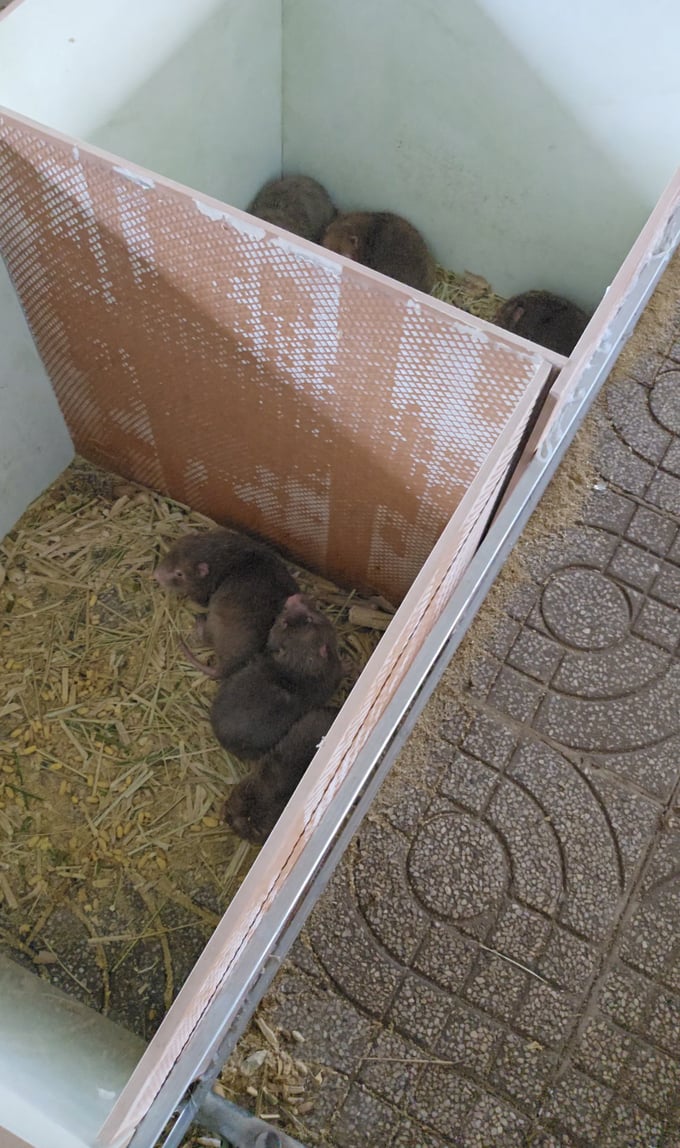
Cages for captive bamboo rats. Photo: Reporters.
"Do you have any langurs?", I asked. "We do have langurs, but only frozen ones because these animals live on high tree branches, and they can only be hunted with guns. Occasionally, we have live ones caught in traps, though injured. However, it's difficult to transport them alive. If there's demand, we deliver immediately; otherwise, we freeze them. If you place an order, I can guarantee fresh products for you, with all internal organs intact," M. explained. Sensing my surprise, my friend explained further, "If a langur's internal organs are missing, the price drops by half because I've heard that langur intestines are used in traditional medicine. Also, a specialy dish called 'nậm pịa' is made from the intestines." I hesitantly asked, "Surely, this type of profession would require some sort of protection, otherwise, it seems very risky?" M. just smiled at me without responding.
I inquired further, "What items do you currently have in stock?" M. replied, "I have live bamboo rats and monitor lizards in cages, and frozen bamboo rats, civets, pigs, mouse-deer, and deer. But I assure you, my stock is fresh."
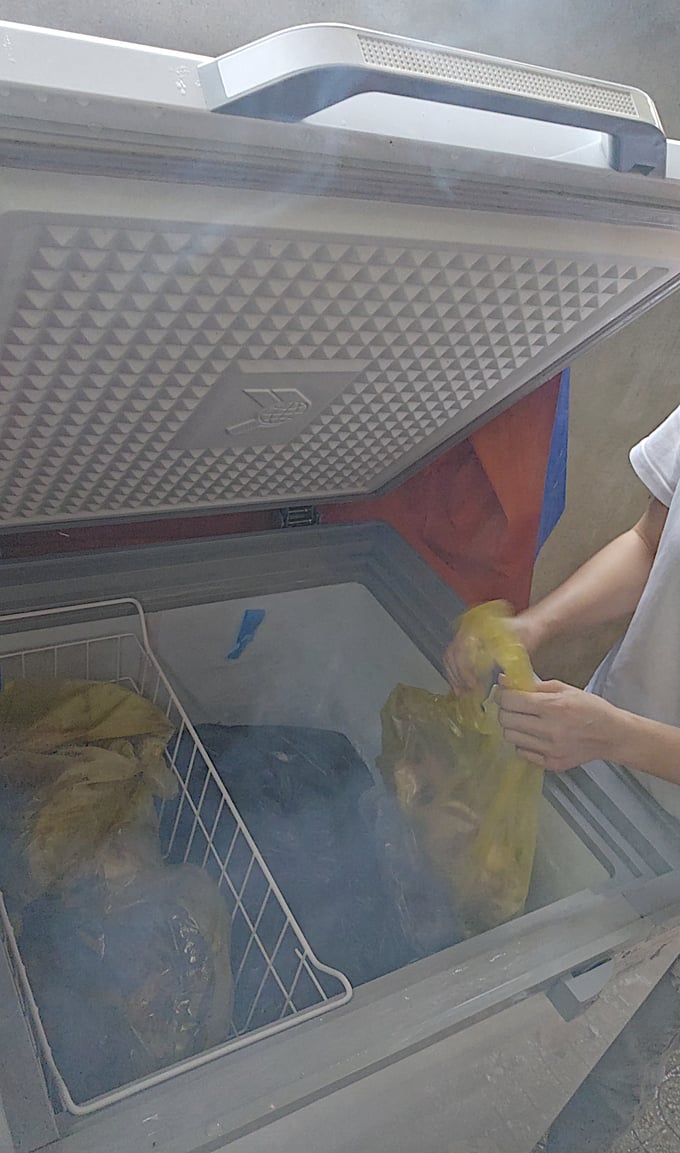
Three-compartment freezer in the corner of M.'s caging area containing plastic bags filled with various types of wildlife meat. Photo: Reporters.
After preparing the bamboo rats, M. led us to the caging area, located next to a small thirty-square-meter garden. According to M., this area was previously used as a pig pen, but he repurposed it to house wild animals. Located next to the entrance of the caging area was a metal cage divided into two compartments, containing several large monitor lizards. M. revealed that the monitor lizards had been caged for a few days without any purchase offer, so they were becoming emaciated. "These lizards are said to eat crabs, frogs, and insects. But I haven't had time to find food for them. They won't eat fruits, so they're getting skinny. They probably won't survive much longer," M. said.
The caging area comprised of two rows of small cages, with each row containing three square compartments made of large bricks, and secured with iron frames. Each compartment housed 5 to 6 bamboo rats. "These bamboo rats arrived yesterday, and they're still fat. Bamboo rats are easy to feed, they eat simple food, so they don't get skinny quickly like the lizards," M. explained.
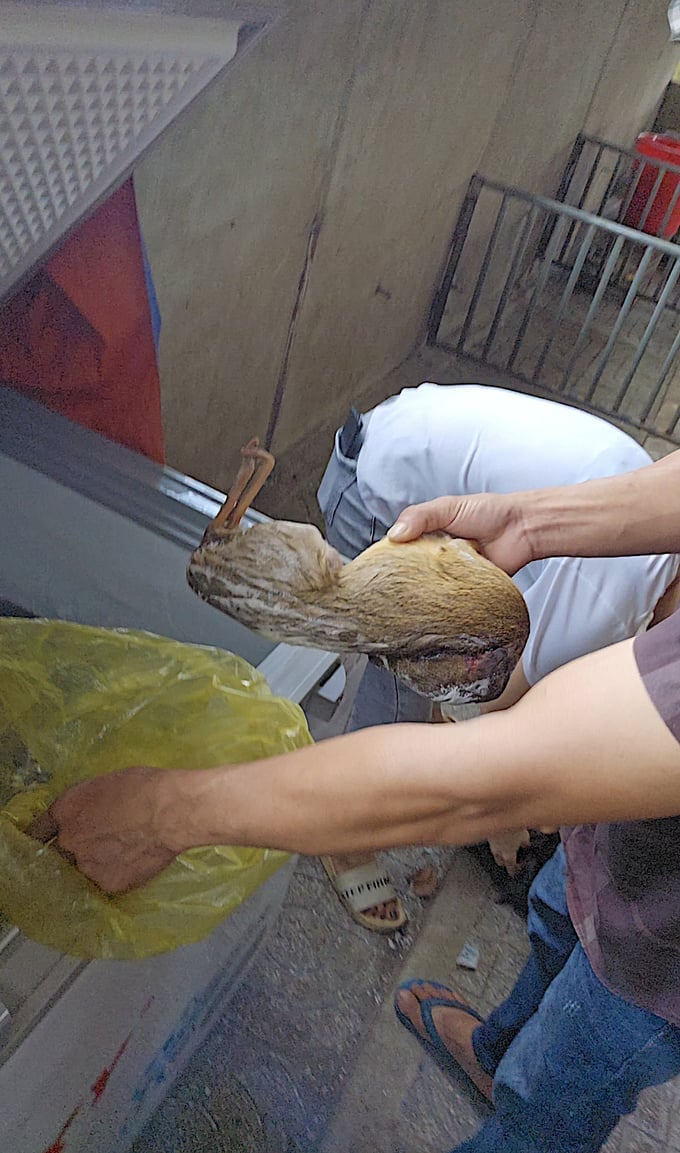
A frozen mouse-deer. Photo: Reporters.
At M.'s house, there are two freezers: one large three-compartment freezer placed within the caging area, and the other located near the kitchen area. Both freezers contained numerous colorful plastic bags filled with various types of wild animal meat. "The frozen stock in the freezer includes authentic and fresh civets, pigs, deer, mouse-deer, bamboo rats, and muntjacs. I will take full responsibility if the meat is not fresh or tasty," M.'s wife said as she opened the freezer lid, pulling out bags of different sizes.
After some conversation, I inquired M., "How do you manage to bring the goods here without being caught? Do you meet with the intermediaries in Cambodia in person?" M. replied, "As long as we have someone to introduce and vouche for us, they will agree to meet."
"When you have orders, do you personally travel to Cambodia to make the transaction, or do they deliver it to you here?" "There are various methods. Usually, we do the exchange covertly in border areas, but sometimes I personally travel out to collect it. We're locals, so as long as we have our ID cards, crossing the border is easy for us, whereas you will need a passport. However, going to collect the goods in person is risky because the local authorities maybe waiting to aprehend us. There's also the risk of a bad deal, where they might hand us the goods and then report to the patrols, who will intercept us on the way back. If the quantity is large and safety is a concern, we pay extra for them to deliver it to a designated gathering point."
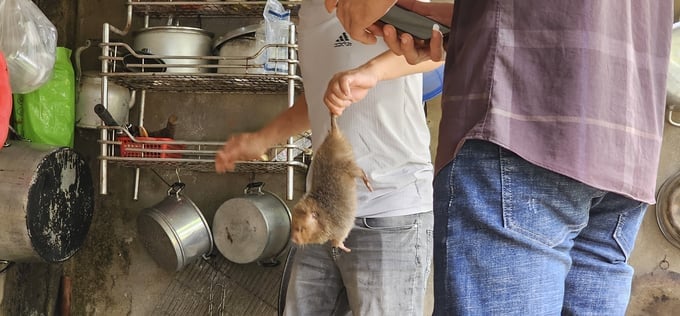
A caught live bamboo rat. Photo: Reporters.
M. revealed another method of transporting wild animals, which involves utilizing people who regularly visit markets for small-scale trading. "These people carry their merchandise to the market in Cambodia every day, then they buy 'scraps' to fill their vehicles and return to Vietnam. However, the scraps are only a cover; the dead wild animals are carefully concealed within packaging materials, boxes, effectively making them invisible to patrols. Moreover, they cross the border on a daily basis, and are familiar faces, so they are often not subjected to inspections," M. explained.
"You must have many connections to deal in such prohibited items," I pressed on. M. countered, "What do you think? Without connections, how could I manage this business?" I continued, "Have you ever been caught before?" M. responded, "No, never. I wouldn't have continued if I had. This job is only on the side; I mostly work with timber."
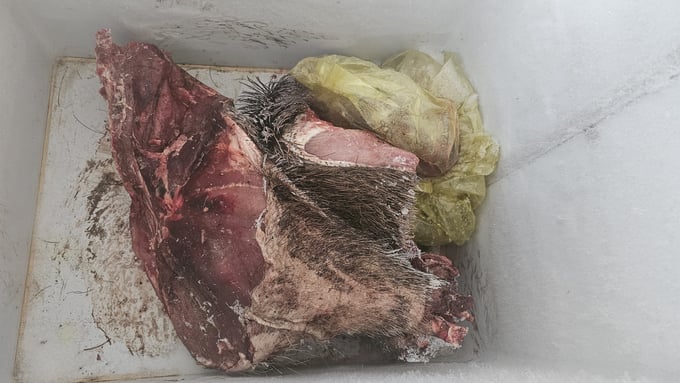
Wild game meat (deer or wild boar?) in the outdoors two-compartment freezer. Photo: Reporters.
Dong Xoai city is home to a prominent figure, H.B., who is renowned as an established kingpin supplier of various wild animals. Mr. B. owns a discreet garden restaurant, which is well-known for its wide array of wild game dishes. In addition to the common dishes of pork, bamboo rat, mouse-deer, and civit, which Mr. B. claims are always available, rare dishes made from pangolins, langurs, and king cobras are not always in stock. However, if requested by customers, they can be made available within "a few days." Similar to Mr. B.'s restaurant, another establishment run by T.T., which nestles discreetly within a compound along National Highway 14, is also a preferred destination for connoisseurs of wild game cuisine.
Translated by Nguyen Hai Long

(VAN) Cold-barn systems efficiently manage environmental and temperature conditions, which aids in the prevention of respiratory diseases in pigs and protects them from the vectors that transmit African swine fevers.

(VAN) To tackle challenges, the project 'Addressing key technical bottlenecks in the grouper supply chain in Vietnam' has been underway since 2024.

(VAN) The project 'Disease-Resilient and Sustainable Cassava Production Systems in the Mekong Region', funded by the Australian Center for International Agricultural Research (ACIAR), is being implemented from 2024 to 2028.

(VAN) Data from 10,000 farming households will help professionalize production organization and support the implementation of the One Million Hectares Program for High-Quality, Low-Emission Rice Cultivation.

(VAN) FAO Director-General QU Dongyu marks International Day of Plant Health at NENA conference.

(VAN) Deputy Minister of Agriculture and Environment Hoang Trung affirmed that floriculture and ornamental plants are a growing industry that receives significant global attention.

(VAN) The three staple crops dominating modern diets – corn, rice and wheat – are familiar to Americans. However, fourth place is held by a dark horse: cassava.